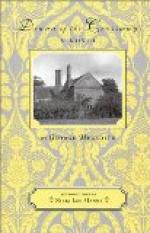The Bull’s Head, or British Jury of Twelve, with the wig on it, was faced during the latter half of a week of good news. First, Mr. Thomas Redworth was returned to Parliament by a stout majority for the Borough of Orrybridge: the Hon. Percy Dacier delivered a brilliant speech in the House of Commons, necessarily pleasing to his uncle: Lord Larrian obtained the command of the Rock: the house of The Crossways was let to a tenant approved by Mr. Braddock: Diana received the opening proof-sheets of her little volume, and an instalment of the modest honorarium: and finally, the Plaintiff in the suit involving her name was adjudged to have not proved his charge.
She heard of it without a change of countenance.
She could not have wished it the reverse; she was exonerated. But she was not free; far from that; and she revenged herself on the friends who made much of her triumph and overlooked her plight, by showing no sign of satisfaction. There was in her bosom a revolt at the legal consequences of the verdict—or blunt acquiescence of the Law in the conditions possibly to be imposed on her unless she went straight to the relieving phial; and the burden of keeping it under, set her wildest humour alight, somewhat as Redworth remembered of her on the journey from The Crossways to Copsley. This ironic fury, coming of the contrast of the outer and the inner, would have been indulged to the extent of permanent injury to her disposition had not her beloved Emma, immediately after the tension of the struggle ceased, required her tenderest aid. Lady Dunstane chanted victory, and at night collapsed. By the advice of her physician she was removed to Copsley, where Diana’s labour of anxious nursing restored her through love to a saner spirit. The hopefulness of life must bloom again in the heart whose prayers are offered for a life dearer than its own to be preserved. A little return of confidence in Sir Lukin also refreshed her when she saw that the poor creature did honestly, in his shaggy rough male fashion, reverence and cling to the flower of souls he named as his wife. His piteous groans of self-accusation during the crisis haunted her, and made the conduct and nature of men a bewilderment to her still young understanding. Save for the knot of her sensations (hardly a mental memory, but a sullen knot) which she did not disentangle to charge him with his complicity in the blind rashness of her marriage, she might have felt sisterly, as warmly as she compassionated him.
It was midwinter when Dame Gossip, who keeps the exotic world alive with her fanning whispers, related that the lovely Mrs. Warwick had left England on board the schooner-yacht Clarissa, with Lord and Lady Esquart, for a voyage in the Mediterranean: and (behind her hand) that the reason was urgent, inasmuch as she fled to escape the meshes of the terrific net of the marital law brutally whirled to capture her by the man her husband.




